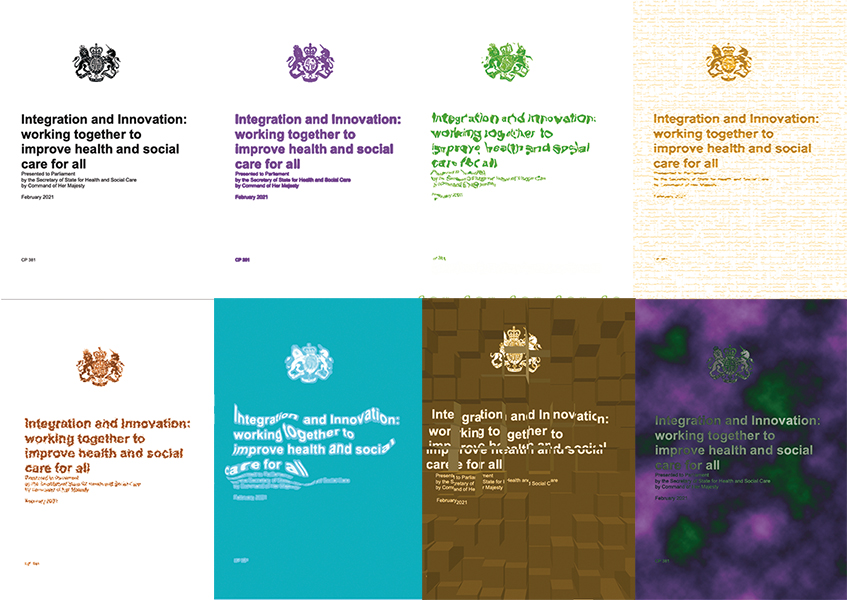Here we go again: MiP’s view on the white paper
Managers will welcome many proposals in the government’s NHS white paper, but poor timing, confusion over how the new system will work and vague threats of renewed political interference leave plenty of room for scepticism.

The government’s NHS white paper, Integration and Innovation, heralds yet another big shake up in the English NHS—the twenty-first since 1974, according to the Institute for Government, but the first to be carried out in the midst of a deadly global pandemic. .
Among a ragbag of piecemeal proposals on social care, public health and data management, the white paper outlines plans to abolish CCGs, give legal footing to integrated care systems (ICSs) and shift the NHS’s modus operandi away from competition towards collaboration. So far, so good for most MiP members, at least on paper. Less welcome, probably, will be the proposals for tighter political control over NHS England and local decision making.
MiP cautiously embraced the broad thrust of the plans, but is less keen on some of the details and omissions. “Managers welcome the proposals to ditch wasteful competition, strengthen local planning and enshrine in law the merger of NHS England and NHS Improvement,” says MiP chief executive Jon Restell. “But we’re deeply sceptical about the need for more political control and concerned at the lack of any coherent plans for social care. Integration will not work properly until the underfunding of social care is fixed.“
When MiP’s National Committee discussed the white paper in March, members also voiced concerns about vagueness and a lack of coherence in the the plans, the overlooking of children’s services and the feasibility of implementing such ambitious changes while the NHS is still recovering from the pandemic.
Let local managers lead
MiP supports proposals to formalise ICSs and strip away barriers to collaboration. Ever since the Five Year Forward Plan began to unpick the Lansley reforms, the spirit in the NHS has been running strongly towards to collaboration. But with separate boards and budgets, and competition rules still in force, joint working and integration projects can be hard to get off the ground.
But the white paper is vague about what’s expected of ICSs—there’s no definition of ‘integration’, for example—or how much autonomy they will have. “We don’t know yet if there will be a national model for what a good ICS should look like,” says Restell. “Many are already going ahead with their own plans. Will they be reined in? And will less mature ICSs have a model imposed on them?”
And there is a flat contradiction in the white paper between its promises about local autonomy and noises about tighter political control over the system. Restell warns that proposals to give ministers “appropriate intervention powers” over NHS England could be seen “as pulling back on NHS England’s arm’s-length status”, and may prevent, for example, a future chief executive from spelling out the NHS’s funding needs, as Simon Stevens did before the 2015 election. “Replacing a leader who can speak with some independence with someone who is more of a political mouthpiece would seriously concern us,” Restell says.
These concerns are shared by King’s Fund chief executive Richard Murray, who argues that NHS England’s independence has been one of the few successes of previous reforms. ”While it is right to clarify who is accountable for the health service,” he says, “the government should protect the day-to-day clinical and operational independence of the NHS.”
Proposals to give ministers powers to create new trusts and intervene at any stage in local reorganisations also risk politicising local NHS decisions, as do suggestions that ministers may be given more power over local senior appointments. “What if every chief executive has to be approved by ministers? Where would that leave the local boards?” asks Restell.
Who’s in charge?
Accountability and system leadership are particular weak spots in the white paper. With two ICS boards (one for NHS services, and a ‘partnership board’ bringing them together with social care and other relevant public services), trusts retaining their own autonomous boards and uncertainty surrounding the status of provider collaboratives, it’s hard to see who will be in charge.
Many local leaders could find themselves sitting on several boards, often with competing priorities, potentially leading to confusion, wasteful duplication of effort and buck-passing—not to mention meeting fatigue. Inertia at local level could also increase the opportunity for central political intervention, effectively reducing local autonomy rather than increasing it.
MiP is also concerned that the white paper offers nothing to change managers’ incentives or motivations. “If there’s nothing in the performance framework about collaboration, there will be no collaboration,” warns Restell. “A lot of chief executives still say waiting lists will be their ‘hire and fire’ issue, not whether they collaborated well in the ICS.”
Be sensitive to the recovery
Major reforms always bring distraction, uncertainty and delays. And however essential these reforms may be, the timing could hardly be worse.
Hugh Alderwick, head of policy at the Health Foundation, says most previous reorganisations “have delivered little measurable benefit” and another shake-up could “distract the system” just as services are recovering from COVID-19. “The NHS has a long list of other priorities—including addressing the backlog of unmet care needs, fixing chronic staff shortages, and working with others to help tackle wide and unjust health inequalities,” he explains.
MiP has already warned that “managers and other NHS staff are exhausted and working at the limit,” and managing major structural change could be a “dangerous distraction” from tackling the pandemic and the valuable work of locking-in the benefits of some of new ways of working the NHS had developed.
“People focus on what their new jobs might be or whether they will have a job at all,” Restell explains. “New leaders have to be appointed and serve out their notice. That can affect everyone as urgent decisions tumble down the road and make operational or programme manager’s jobs much more difficult.”
At the same time, MiP sees the argument for biting the bullet. Legislation is needed to make ICSs work properly and the NHS itself has asked for many of the proposed reforms. And if the gains from greater integration and collaboration can be harnessed quickly, it could aid the recovery by enabling NHS organisations to share hospital facilities, clinic space and staff.
Keep it simple
Despite the ambitious scope, the white paper is almost silent on how the reforms will be implemented or how the resulting staff changes will be handled. While MiP members working in CCGs, Commissioning Support Units, NHS England and some other arm’s-length bodies will be directly affected, members working for trusts could also be drawn in if provider services are also reorganised.
Restell says: “Our message to the government is: keep it simple, concentrate on enshrining in legislation what’s already happening on the ground, and be open with staff as soon as possible about what it means for them.”
Although MiP is keen to avoid the restructuring fatigue seen in previous reforms, which often led to an exodus of experienced managers fed up with organisational upheaval, “there’s a balance to be struck,” says Restell. “We want to minimise the disruption to members’ jobs, particularly while the pandemic is ongoing. But we also want to make sure there isn’t another reorganisation in a few years’ time.”
MiP is already exploring with NHS England the scope for an agreed national HR framework on how reforms will be implemented how affected staff are treated. “No, we don’t want a top-down reorganisation, but at the same time we don’t want this done badly 42 times over,” Restell explains.
One of the most important lessons from the experience of integration in the other UK nations is that “ICS bodies will not integrate health and care just by existing,” he adds. But there is little sign in the white paper that this lesson has even been studied, let alone learned.
In its initial report on the white paper, the King’s Fund warns “it is not possible to legislate for collaboration and co-ordination of local services”. Collaboration “requires changes to the behaviours, attitudes and relationships of staff and leaders right across the health and care system”, it says, and “those cultural changes take time”.
“Looking at the white paper, three questions leap out right away,” concludes Restell. “Who will be in charge of this? Who will pay for it? And who will be working in it? Those are pretty fundamental questions and at the moment we don’t have clear answers to any of them.”
- Please help us to represent you more effectively by taking part in our members’ survey on the ICS transition. The survey is open to all managers who think their jobs maybe affected in any way by the reforms. If you have an urgent problem relating to the transition, contact your national officer.
Related News
-

Strange ways, here we come
Creating a ‘neighbourhood NHS’ will demand a different mindset, unfamiliar ways of working and difficult decisions on finances and staffing. Middle managers as well as senior leaders will play a big part in making it happen, writes Nigel Edwards.
-

Labour’s reforms: a mixed bag for managers
Ahead of the ten-year plan, Wes Streeting and NHS leaders have been sketching out some ideas for NHS reform. Jon Restell and Rhys McKenzie explain what these initial proposals could mean for managers.
-

Jon Restell’s Leading Edge | Giving managers legitimacy is the key to making reform work
The false trade off between the frontline and everybody else has become a deep-seated belief in a two-tier workforce. The health secretary needs to unite all NHS staff and give managers permission, encouragement and the tools they need to get his reforms off the ground.